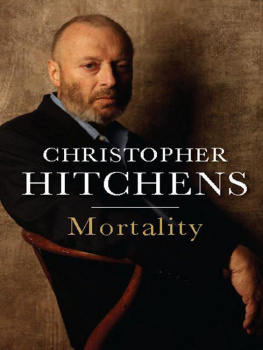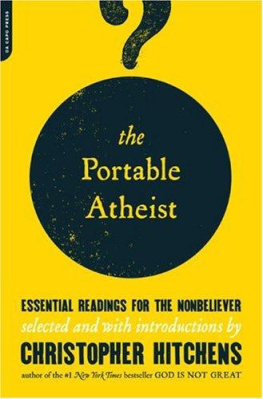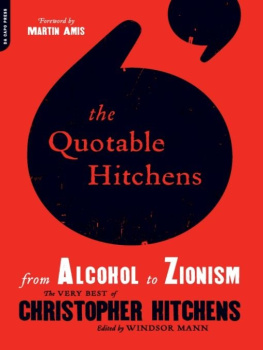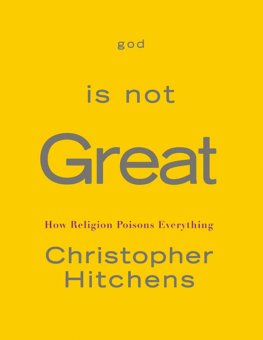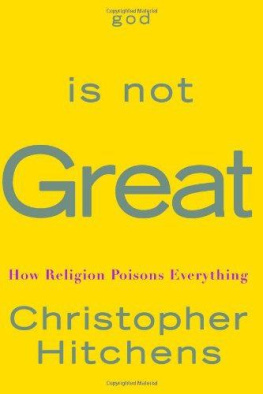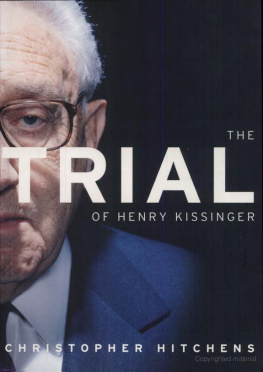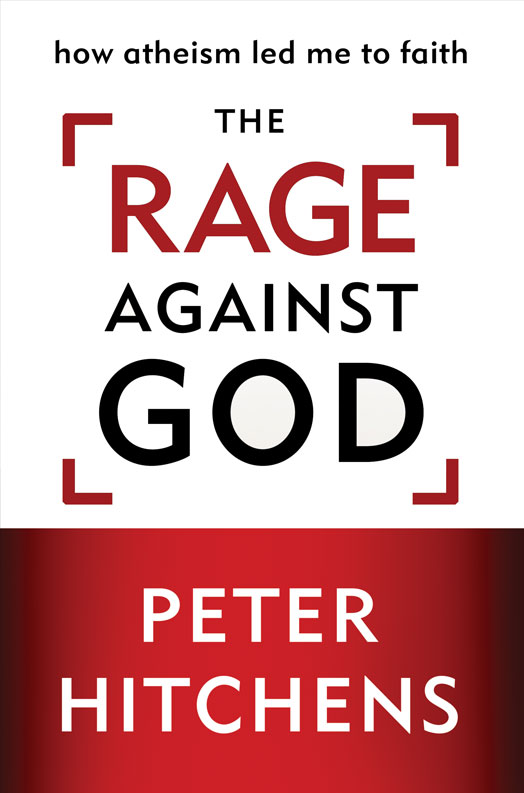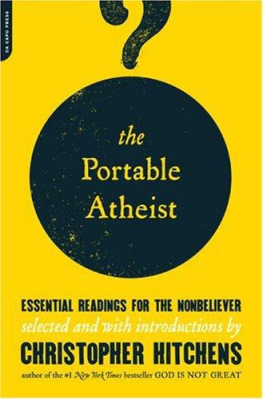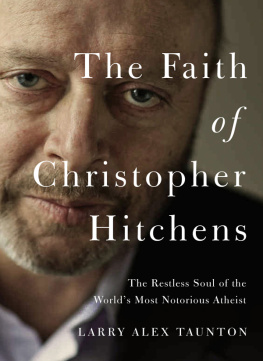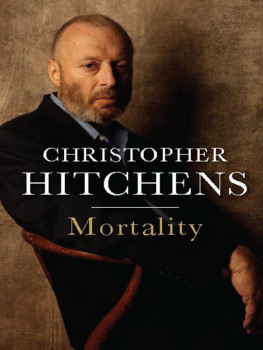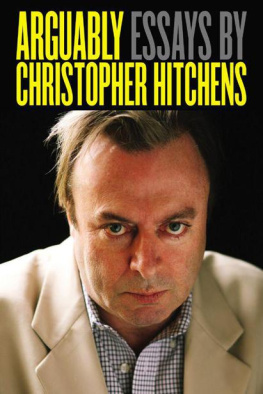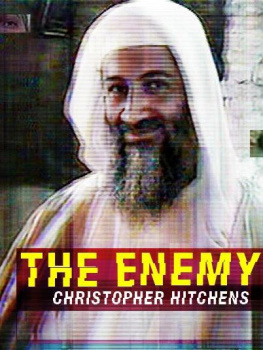Mortality
ALSO BY CHRISTOPHER HITCHENS
Books
Hostage to History: Cyprus from the Ottomans to Kissinger
Blood, Class, and Nostalgia: Anglo-AmericanIronies
Imperial Spoils: The Curious Case of the Elgin Marbles
Why Orwell Matters
No One Left to Lie To: The Triangulations of William Jefferson Clinton
Letters to a Young Contrarian
The Trial of Henry Kissinger
Thomas Jefferson: Author of America
Thomas Paines Rights of Man: A Biography
God Is Not Great: How Religion Poisons Everything
The Portable Atheist
Hitch-22 : A Memoir
Mortality
Pamphlets
Karl Marx and the Paris Commune
The Monarchy: A Critique of Britains Favorite Fetish
The Missionary Position: Mother Teresa in Theory and Practice
A Long Short War: The Liberation of Iraq
Essays
Prepared for the Worst: Essays and Minority Reports
For the Sake of Argument
Unacknowledged Legislation: Writers in the Public Sphere
Love, Poverty, and War: Journeys and Essays
Arguably
Collaborations
James Callaghan: The Road to Number Ten (with Peter Kellner)
Blaming the Victims (edited with Edward Said)
When the Borders Bleed: The Struggle of the Kurds
(photographs by Ed Kash)
International Territory: The United Nations
(photographs by Adam Bartos)
Vanity Fairs Hollywood (with Graydon Carter and David Friend)
CHRISTOPHER
HITCHENS

Mortality
Foreword by Graydon Carter
Afterword by Carol Blue

First published in Australia and New Zealand by Allen & Unwin in 2012
First published in the United States in 2012 by Twelve, an imprint of Grand Central Publishing, Hachette Book Group, Inc.
Copyright Christopher Hitchens 2012
All rights reserved. No part of this book may be reproduced or transmitted in any form or by any means, electronic or mechanical, including photocopying, recording or by any information storage and retrieval system, without prior permission in writing from the publisher. The Australian Copyright Act 1968 (the Act) allows a maximum of one chapter or 10 per cent of this book, whichever is the greater, to be photocopied by any educational institution for its educational purposes provided that the educational institution (or body that administers it) has given a remuneration notice to Copyright Agency Limited (CAL) under the Act.
Allen & Unwin
Sydney, Melbourne, Auckland, London
83 Alexander Street
Crows Nest NSW 2065
Australia
| Phone: | (61 2) 8425 0100 |
| Email: | info@allenandunwin.com |
| Web: | www.allenandunwin.com |
Cataloguing-in-Publication details are available
from the National Library of Australia
www.trove.nla.gov.au
ISBN 978 1 74237 461 1
Internal design and typesetting by Jouve, Brattleboro, Vermont; and Chennai, India
Printed and bound in Australia by Griffin Press
10 9 8 7 6 5 4 3 2 1

Grateful acknowledgment is made to Vanity Fair, in
which much of this book first appeared,
in somewhat different form.
Contents
by Graydon Carter
by Carol Blue
BY
GRAYDON CARTER
At a dinner in Los Angeles this spring, a young actor named Emile Hirsch came up to me in a state of somewhat high excitement. He knew I had worked with Christopher Hitchens for many years, and he just wanted to talk about Christopher with someone who knew him. Hed read Hitch-22 and was well into the Kissinger book, and he said that Christophers writing had affected him in a way that almost no one elses had. In the months following Christophers death, I had similar encounters with young people who felt compelled to talk about how his writing had touched them. Its no exaggeration to say that Christopher had few equals in the sphere of spirited commentary. But there was something in his saucy fearlessness, in his great turbine of a mind, and in his sociable but unpredictable brand of anarchy that seriously touched kids in their twenties and early thirties in much the same way that Hunter S. Thompson had a generation before. Young Emile asked if there was going to be a memorial service, and I told him that there would be one in New York and that we were bookmarking April 20th as a tentative date.
The memorial was indeed held on the 20th, in the Great Hall at Cooper Union in Greenwich Village. My Vanity Fair colleagues Aime Bell (Christophers longtime editor at the magazine) and Sara Marks organized the readingsall of them from Christophers own work. We wanted to produce a program that would be cozy and loving, but in no way sentimental or mawkish. And the great and the good of English letters turned up to pay tributeand to console his widow, Carol, and his three children. Martin Amis, Tom Stoppard, Salman Rushdie, Ian McEwan, and James Fenton were there and they all spoke. Editors such as Anna Wintour, David Remnick, Jim Kelly, and Rick Stengel came; so did Christophers brother Peter, Andrew Sullivan, Christopher Buckley, Andrew and Leslie Cockburn and their daughter the fine actress Olivia Wilde, and Andrews brother Patrick. The Bush administration was represented by former deputy defense secretary Paul Wolfowitza remnant of the curious right turn Christopher took in the lead-up to the Iraq War. Hollywood was represented by Sean Pennand, as I was pleased to see, by young Mr. Hirsch.
After the memorial, the participants retired to the Waverly Inn nearby and drank and smoked in the sunshine and reminisced about Christopher. Although the day was bathed in sorrow, there was a magical quality to the afternoon as it spilled into the evening and through to midnight, when there were still a dozen or more mourners. For those who were there, Christophers memorial was, as we used to say in the 1960s, a happening, and a day we will not soon forget.
For the fact is that Christopher was one of lifes singular charactersa wit, a charmer, a trouble-maker, and a dear and devoted friend. He was a man of insatiable appetitesfor cigarettes, for scotch, for company, for great writing, and, above all, for conversation. That he had an output to equal what he took in was the miracle in the man. Youd be hard-pressed to find a writer who could match the outpouring of exquisitely crafted columns, essays, articles, and books he produced over the past four decades. He wrote oftenconstantly, in fact, and right up to the endthe words in this moving volume being among his last. And Christopher wrote fast, frequently without the benefit of a second draft or even corrections. Perhaps in the back of his mind he knew that his time on the stage would end in the second act, and he was racing to get it all in, and to get it all out. I can recall a lunch in 1991, when I was editing the New York Observer, and he and Aime and I got together for a quick bite at a restaurant on Madison, no longer there. Christophers copy was due early that afternoon. Pre-lunch tumblers of scotch were followed by a couple of glasses of wine during the meal and then a couple of post-meal cognacs. That was his intake. After stumbling back to the office, we set him up at a rickety table and an old Olivetti, and in a symphony of clacking he produced a 1,000-word column of near perfection in under half an hour.
Next page
